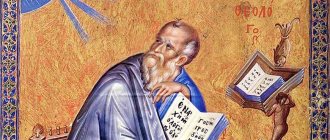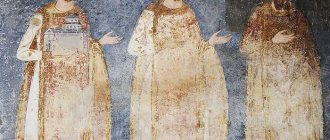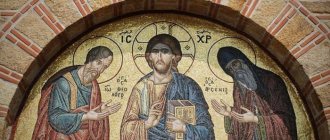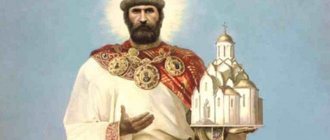Epiphany Cathedral in Yelokhov
On October 9, the Holy Orthodox Church brightly celebrates the death of one of the first and beloved disciples of Christ. It is no coincidence that his confidant, apostle and evangelist, John the Theologian, is called the Apostle of Love.
Saint John was the son of the Galilean fisherman Zebedee. His mother's name was Salome. Before his conversion to Christ, he was a disciple of St. John the Baptist. After turning to Christ, Saint John never again departed from the Lord. Because I loved Him with my pure heart more than anything else in the world.
During the earthly life of the Lord, John, among the three beloved disciples of the Lord, was honored to witness the appearance of divine glory on Mount Tabor.
Was at the resurrection of Jairus' daughter. At the Last Supper, the Lord revealed Judas, the traitor, to him.
Imbued with love for his Lord and Heavenly Teacher, John, the only one of the disciples, stood at the Cross during the Lord’s suffering. And to him, as a pure virgin, the Lord from the Cross entrusted in his dying moments the care of His Most Pure Mother.
Before the Dormition of the Mother of God, he lived in Jerusalem. And after Her Dormition in the city of Ephesus, where he preached the Gospel of Christ.
For preaching the Gospel, he was first exiled to Rome, where he was tortured. And when the poison and boiling oil did not harm him, Emperor Domitian exiled him to the island of Patmos.
There he wrote a book - the Apocalypse, which sets out the future fate of the Christian world.
Under Domitian's good successor, Nerva, Saint John was released and returned to Ephesus again. There John died peacefully, the only one of all the apostles. In addition to the Apocalypse, he wrote the Gospel and three conciliar messages.
The Apostle John the Theologian, says Archimandrite Kirill (Pavlov), confessor of the Trinity-Sergius Lavra, is usually called the Apostle of Love. Because he mainly preached mutual love for each other.
Saint John was imbued with deep love for the Christians who lived with him and for all Christians in general. The desire for peace and love to spread between them, and not enmity and hatred. He attached high importance to love and believed that fulfilling the commandment of love alone was enough for salvation.
Tradition says that when he became very old and could not go to different countries preaching the Gospel, then, sitting in his house, he constantly repeated to those who came to him:
- Children, love each other! When asked why he repeated these words so often, he answered:
– Whoever fulfills the commandment of love will fulfill all the commandments. And in his Epistles to Christians that have come down to us, he often repeats:
– Let us love God because He first loved us. He who does not love has not known God, because God is love (1 John 4.19, 8). He who loves God must also love his neighbor, because whoever does not love his brother shows by this that he does not love God either.
Just as Christ laid down his life for us, so we must lay down our lives for our brothers. He who loves his brother abides in the light. And whoever hates his brother is in darkness (1 John 3.16; 2.10-11). Likewise, in the Gospel, the Apostle John draws attention mainly to those incidents from the life of the Savior in which His love for people was primarily expressed and which primarily aroused love for Christ the Savior.
What reasons motivate us to love each other? First of all, by nature we are brothers. Because everyone descended from one progenitor Adam. And in heaven we have a common Father - God. This means that we all make up one great family and therefore must love each other as if we were half-blooded. Moreover, constituting one family as people, all of us, by the title of Christians, are in an even closer relationship with each other. Because, according to the teaching of the Apostle Paul, we constitute one spiritual body, whose head is Christ (Col. 1:18).
But in what relation are the members to each other in one natural body? Are they at odds with each other? Is it armed, for example, with a hand against a leg or an eye against an ear? No, they act in harmony with each other. They mutually assist each other and are in such a community that if one member suffers, then the others suffer with it.
If irrational members act this way, then much more should we, the rational members of the spiritual Body, whose head is Christ, act this way. He wants us to live in peace and harmony among ourselves.
The Lord Jesus Christ commands most of all that we love one another.
Remember what He prayed for and what He inspired to the apostles before His suffering:
“Holy Father,” He cried out to His Heavenly Father, “keep them from hostility, so that they may be one, just as We are (John 17.11).
“My children,” He said to the apostles, “I command you, that you love one another (John 13.34). Do you see how much Jesus Christ wanted us to live in mutual love?
Jesus Christ not only commanded us to love other people, but also presented in Himself a model of love for us. Why did He, being God, descend from heaven to earth and take upon Himself our mortal flesh? Out of love for us people. Why was He, an innocent one, subjected to severe suffering and crucified on the Cross as a lawless one? For the same love for us.
Why is He patient with our sins and not only has mercy on us, but also sends us various gifts of grace? Out of love for us. We must love each other even more because love for our neighbors has a high moral dignity and constitutes the great perfection of a Christian. She likens us to God, because God is love (1 John 4:8).
God acts in everything out of love for His creations, especially for us - people whom He loves so much that He sent His only begotten Son into the world, so that we may live by Him.
Love is the source and sum of all virtues, and therefore it is higher than all other virtues.
“Now,” says the Apostle Paul, “faith, hope, and love abide; but the greatest of these is love (1 Cor. 13.13). Without love, all our knowledge, deeds and faith itself have no moral value.
Archimandrite Kirill (Pavlov) not only talked about John the Theologian and what love is, but also showed an example of it with his life. Everyone who met the priest will remember this forever.
What is love for an Orthodox person?
Photo: Semyaivera.ru
Watching TV shows and listening to love songs, many have developed the concepts of love, availability, passion, unreasonable sacrifice, as a result of which even the closest people can suffer or a person is even ready to commit crimes.
Christian love is not a fanatical desire to be with a loved one, it does not suffer from unsatisfied passion, it is not a mind-blowing mother’s love for a child, man or woman, but something else. There is no place for blind fanaticism, since it violates the commandment “thou shalt not make for yourself an idol,” as well as the willingness to do anything for the sake of a loved one. Christian love is kindness, sensitivity, understanding, willingness to help at any time, the absence of obsessions, pressure, jealousy and a sense of belonging:
- Christian love is not destruction, but creation. There will be no pangs of jealousy, no sense of ownership, no love spells, no conspiracies, no violence against a person;
- A Christian will never agree to violate the commandments of Christ out of love, including suicide, murder, no matter how hard it may be for him;
- In Christian love, not a single person will put anyone above God in his soul, he will not make him his idol;
- The most important thing about her is mercy.
- The torment of non-Christian and human love is not characteristic of a Christian, since he loves not with passion, but with human love, with which the Creator created all his creations;
- Christian love presupposes a sense of duty, duty to one's neighbor;
This type of sacrifice and love was preached by John the Theologian, enlightening Christians in Asia, Ephesus. According to legend, this apostle did not relish physical death and on the day of his death he ordered a cross-shaped hole to be dug for himself, in which he was buried alive. After some time it was torn apart, but the body was not found. According to legend, every year a miracle occurs on it; on May 21, a delicate substance with a pleasant smell and healing power appears on the grave. Therefore, Orthodox Christians celebrate the Day of St. John the Theologian also on May 21 (new style).
Childhood and youth
The future beloved messenger of the Almighty was born in the northeast of Israel in the year 6 (according to another version, in the year 17, since at the time of the crucifixion of Jesus in the year 33, according to church canons, he turned 16 years old).
His father Zebedee was reputed to be a fairly wealthy Galilean fisherman who had hired workers. Mother, Solomiya, was the daughter from the first marriage of Saint Joseph, a descendant of King David, who, after the death of his first wife, became engaged to the Virgin Mary according to the choice of the Lord himself. As the legend says, the high priest, at the behest of an angel, then gathered the widowers, distributed staffs to them, and in the hands of Joseph it suddenly blossomed (according to other sources, a dove flew out of it). So Maria became his wife (while maintaining her virginity). Thus, Christ was John’s mother’s half-brother, and his uncle.
Young Apostle John
When the boy grew up, he began fishing with his father and brother in the Sea of Galilee (now Lake Tiberias), putting fishing gear in order, showing patience and hard work. One day, not far from them, a group of believers and the Messiah appeared on the seashore. He boarded the empty boat of the fisherman Simon (later the Apostle Peter), who, together with his brother Andrei (later called the First-Called), fished all night, but never caught anything. First, the Lord talked with people, and then showed a miracle, indicating where to cast the net in order to get an unprecedented catch. The shocked fishermen pulled out so many fish that their boats became full to the brim and nearly sank. After this, Christ called them to follow him, making them his first disciples.
Then the savior approached the Zavedeevs, who were among those who listened to him on the shore. The brothers sat with their father in the boat and went about their usual business. Jesus invited them to follow him. And the brothers responded to the call of Christ, leaving their father and their entire previous life.
Biography of John the Evangelist
John the Theologian is the youngest of the first twelve disciples of Christ, called by him to the apostleship and endowed with miraculous power, one of those whom God honored with special love and intimacy, the brother of the Apostle James.
John the Theologian. Russian icon of the 17th century
All the works of which he is considered the author - the Gospel, the Apocalypse, the three epistles included in the Bible - are permeated with the theme of love, which is why he was nicknamed the “apostle of love.” Christ called him “the son of thunder” (for his strength of spirit and ardent, impetuous nature), in Jerusalem he was revered as “the pillar of the church,” and the eagle became a traditional symbolic representation (to commemorate the height of the flight of feelings and thoughts).









